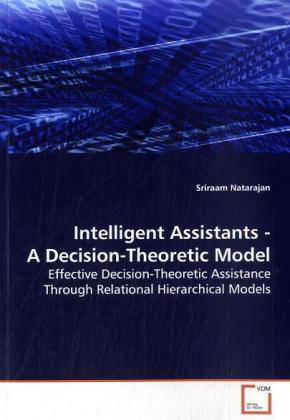
Bedankt voor het vertrouwen het afgelopen jaar! Om jou te bedanken bieden we GRATIS verzending (in België) aan op alles gedurende de hele maand januari.
- Afhalen na 1 uur in een winkel met voorraad
- In januari gratis thuislevering in België
- Ruim aanbod met 7 miljoen producten
Bedankt voor het vertrouwen het afgelopen jaar! Om jou te bedanken bieden we GRATIS verzending (in België) aan op alles gedurende de hele maand januari.
- Afhalen na 1 uur in een winkel met voorraad
- In januari gratis thuislevering in België
- Ruim aanbod met 7 miljoen producten
Zoeken
Intelligent Assistants - A Decision-Theoretic Model
Effective Decision-Theoretic Assistance Through Relational Hierarchical Models
Sriraam Natarajan
Paperback | Engels
€ 89,45
+ 178 punten
Omschrijving
Building intelligent computer assistants has been a
long-cherished goal of
AI. Many intelligent assistant systems were built
and fine-tuned to specific
application domains. In this work,
we develop a general model of assistance that
combines
three powerful ideas: decision theory, hierarchical
task models and
probabilistic relational languages. We use the
principles of decision theory
to model the general problem of intelligent
assistance. We use a
combination of hierarchical task models and
probabilistic relational
languages to specify prior knowledge of the computer
assistant. The
assistant exploits its prior knowledge to infer the
user's
goals and takes actions to assist the user. We
evaluate the decision
theoretic assistance model in three different
domains including a real-world domain
to demonstrate its generality. We show through
experiments that both the
hierarchical structure of the goals and the
parameter sharing facilitated by
relational models significantly improve the learning
speed of the agent.
Finally, we present
the results of deploying our relational hierarchical
model in a real-world
activity recognition task.
long-cherished goal of
AI. Many intelligent assistant systems were built
and fine-tuned to specific
application domains. In this work,
we develop a general model of assistance that
combines
three powerful ideas: decision theory, hierarchical
task models and
probabilistic relational languages. We use the
principles of decision theory
to model the general problem of intelligent
assistance. We use a
combination of hierarchical task models and
probabilistic relational
languages to specify prior knowledge of the computer
assistant. The
assistant exploits its prior knowledge to infer the
user's
goals and takes actions to assist the user. We
evaluate the decision
theoretic assistance model in three different
domains including a real-world domain
to demonstrate its generality. We show through
experiments that both the
hierarchical structure of the goals and the
parameter sharing facilitated by
relational models significantly improve the learning
speed of the agent.
Finally, we present
the results of deploying our relational hierarchical
model in a real-world
activity recognition task.
Specificaties
Betrokkenen
- Auteur(s):
- Uitgeverij:
Inhoud
- Aantal bladzijden:
- 176
- Taal:
- Engels
Eigenschappen
- Productcode (EAN):
- 9783639145809
- Verschijningsdatum:
- 16/04/2009
- Uitvoering:
- Paperback
- Afmetingen:
- 152 mm x 229 mm
- Gewicht:
- 268 g

Alleen bij Standaard Boekhandel
+ 178 punten op je klantenkaart van Standaard Boekhandel
Beoordelingen
We publiceren alleen reviews die voldoen aan de voorwaarden voor reviews. Bekijk onze voorwaarden voor reviews.









